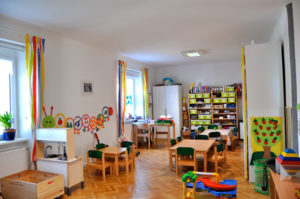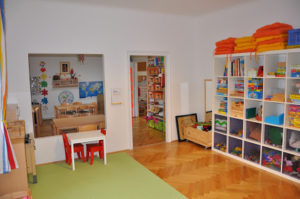Mouse group

The Mouse group is for children aged 1 ½ to 3 ½ years.
Our focal points are:
- Individual care of the children in the large group as well as in small groups
- Individual and flexible familiarisation
- thematic offers
- free game
- Language support
- Supporting and accompanying the children in their personal development, creativity and self-confidence
- Early childhood education: Creating special educational opportunities as well as caring activities in the work with under 2-year-olds
- Sensory development
- Meditation
- Playing, learning, discovering and growing together
The supervisors of the Mouse group are Jana Dallosová and Daniela Horvath.
Elephant group

The Elephant group is for children aged 3 ½ to 6 years and is run bilingually (German/English).
Our focal points are:
- Individual care of the children in the large group as well as in small groups
- Transition to the group of older children
- thematic offers
- free game
- Bilingual German-English Language Support
- Supporting and accompanying the children in their personal development, creativity and self-confidence
- School preparation
- Sensory development
- Meditation
- Playing, learning, discovering and growing together
The carers of the elephant group are Soma Kuna and Andrea Grebner.
The importance of children’s play:
Learning processes are the basis of education. Learning can take place in different forms: Through curiosity, experimentation and self-activity, through discovery and exploration, through design, learning from models, through observation and imitation or learning through action and reflection.
All these forms of learning are expressed in children’s play. Play is the natural form of children’s learning and acquisition of the world. It gives children a great deal of self-determination and creative freedom. In play, children can enter into dialogue with each other, take on new roles, try out new
creative ways and solutions and process and express impressions they have gained. In and through play, they are confronted with rules and norms and learn to participate in a group of playing children.
We see the task of the educators as supporting the children’s joy of playing and encouraging them to engage in playful experiments in which they can gain their own experiences.